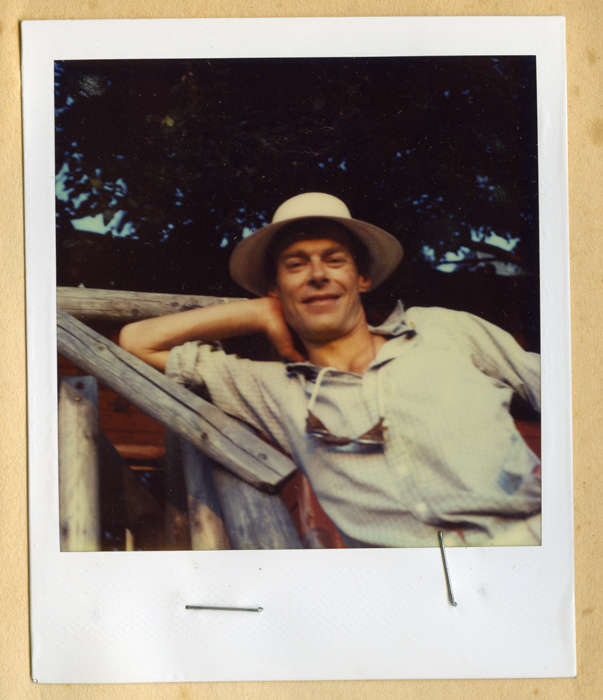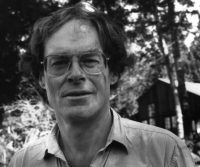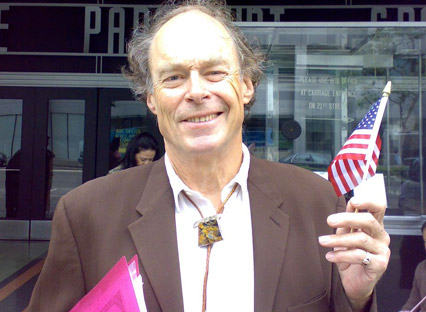Alexander Cockburn and a young American
 Tuesday, July 31, 2012 at 05:00PM
Tuesday, July 31, 2012 at 05:00PM  In her beautiful remembrance of the great radical journalist Alexander Cockburn, who died on July 21, 2012, Joann Wypijewski, writing about the rapier wit with which Cockburn slashed the powerful, wrote, "But, oh, how much more he was the sum of all he loved." His death the other week hit me hard, and in the weeks since I've been mulling over the reasons. His words meant so much to me. Some of my favorites were the ones penned about the things he loved.
In her beautiful remembrance of the great radical journalist Alexander Cockburn, who died on July 21, 2012, Joann Wypijewski, writing about the rapier wit with which Cockburn slashed the powerful, wrote, "But, oh, how much more he was the sum of all he loved." His death the other week hit me hard, and in the weeks since I've been mulling over the reasons. His words meant so much to me. Some of my favorites were the ones penned about the things he loved.
As an American from southeast Ohio, not born until 1971, it would be impossible for me to overstate how unlike anything else I'd ever encountered he was, coming out of the European polemical tradition as he did. That said, as I get older it occurs to me that maybe one reason I admired him was because he reminded me a bit of my father. Though they would have had many areas where they disagreed, as a moderate Republican of the old school my dad and the far-left Cockburn would have actually had some bit of overlap. I've theorized that this was one reason that Cockburn's attacks on the Democratic Party never really scandalized me as much as they did some liberals, and why I always enjoyed his provocateur style. Sometimes my father would challenge my views, largely, I think, to sharpen my mind and to prepare me for the fact that not everyone out in the big world was going to agree with me. If he liked my argument, he'd say, that's quite a well-made point.

Anyway, as I say, I'm an American not born until 1971. This means I was a fish in water where the Democratic/Republican parties were the spectrum of political thought. All through high school in the mid-to-late 80s, for a young person of social conscience this meant aligning with the Democratic Party (I remember canvassing for the unsavory Michael Dukakis--"unsavory," I think that's a word I got from Cockburn), and opposing Reaganism and Young Republicans at every turn--even (or especially) the ones who were your friends. After all, they were the ones it was the most fun arguing with.
Alex's writing, when I encountered it in my early 20s after moving to Chicago, blew through my mind, exploding that whole political spectrum, showing me there were more possibilities than I had imagined. Along with other important people in my life, he and his writing introduced me to the proper Left: the whole culture of working-class solidarity, Marxism, a whole intellectual tradition of thought and culture. He made the point on the spectrum to the left of the Democratic Party not only possible, but attractive.
That said, he wasn't a bit like the vulgar sectarians I'd run into from time to time, hawking the Revolutionary Communist Party paper. I liked some of these people as individuals, yet they were much more enamored of groupthink than seemed wholesome to me. I remember stopping into the Socialist Workers' Party bookshop back in the 90s. I asked the nice old lady behind the counter about some personage--the great C.L.R James, I think it was. I'll never forget the way she turned to her comrade and asked, "What do we think about him?" Yeesh.

Cockburn was all about independent thought. During my fighting days in the 90's, the days when I ran in radical activist circles of all stripes, from communist to anarchist, Cockburn's polemical style was bracing. It inspired and scandalized us by turns. Whenever the Nation arrived, the first thing you'd do was page through to his "Beat the Devil" column. How exciting it was to pluck "CounterPunch" or "The Anderson Valley Advertiser" from the mailbox. You always knew there was going be trouble.
Of course I wanted to be him. This persona was--is--impossibly attractive. The elegant Oxford-trained voice, the style, wit and erudition, all worn so lightly. He had such a nice sense of irony. I remember once he wrote how tiresome it could be with some lefties, always going about rigorously denouncing this and ruthlessly criticizing that.
He was a great fighter, but the real lesson for me, bent over "The Golden Age Is In Us" (still my favorite) and "Corruptions of Empire," was how he had so many, many interests other than just fighting. I cherished the introduction he wrote to P.G. Wodehouse's "The Code of the Woosters," my favorite book by my favorite writer. If I'm not too far wrong, I believe it was Cockburn who introduced me to Wodehouse in the first place.

I only interviewed him once, in the mid 90s, after a dinner preparatory to his address to a church-based peace 'n' justice group in Evanston. He sat down with myself and my then wife. As thrilled as I was to sit down with my hero, I had to tell him I was a bit cross with him. He'd made some critical remarks in "Beat the Devil" about the U.S. "Labor Party" which was then going through birthing pains. I'd been attending meetings, hoping it'd get off the ground as a real U.S. alternative political party. Many in my circle had been doing the same, and his column had pissed off a lot of us off. He gently reminded me that the remarks in question were actually reported by Joann Wypijewski (albeit, he conceded, printed in his column). As for the Labor Party, "I just don't think it's going anywhere," he said. "I hope it does." And you know, he turned out to be quite right.
I met him once more after that, at a reading for the book he co-authored on the CIA and cocaine, "Whiteout," and spoke to him on the phone one other time. I always found him to be just as one would hope: generous with his time, polite, unpretentious, erudite, serious but with a sense of fun and enjoyment taken in the pleasures of life--talking to a pretty girl, for example. (After his audience with myself and my then wife, she remarked--beaming slightly, I noticed--that she'd detected a slight twinkle in his eye when he addressed her.)
I think it was the dawning in me that I was actually more interested in the side of his writing that was about the things he loved that led to my realization that I didn't really have the instinct myself to write about politics. That said, my thirst to understand how the real world works remained unabated, and I would often turn to CounterPunch down the years to slake it, or at least to get a point of view that was unlike anybody else's. And though I've voted for Democrats in recent years, it's always with Cockburn's voice in the back of my mind, telling me it won't do to settle for the lesser of two evils.

I admit I rather lost my taste for fighting over the years. These days, though, I feel the appetite whetted again. God knows there are battles to be joined. If I learned anything from his writing and the example of his life, it's that you never avert your eyes from injustice, and that you do something about it.
I mainly write about film now. And yet my voice, if I have one, is always somehow informed by Cockburn's, though I could only hope to be anywhere near that funny and sharp. One of my favorite things he did was something he probably tossed off in a few minutes: the list he wrote for CounterPunch of the 10 films he loved the most. The bit about how much he loved "Homeward Bound," and wept when the Golden Retriever came over the hill, never fails to amuse me. I can picture that "tough A.R. chick" staring at his tear-stained cheeks in disgust. There have been weeks when, in the midst of trying to compose an article about some movie, I'd glance at his list every day: to reset my mind, to keep myself from becoming tiresome, to remind me what movies are really all about at the end of the day. When I think of him--and I know I always will--that list will be one of the many things I'll think of.



Reader Comments (1)
What a beautifully written tribute to Alexander Cockburn who you've admired for a very long time.